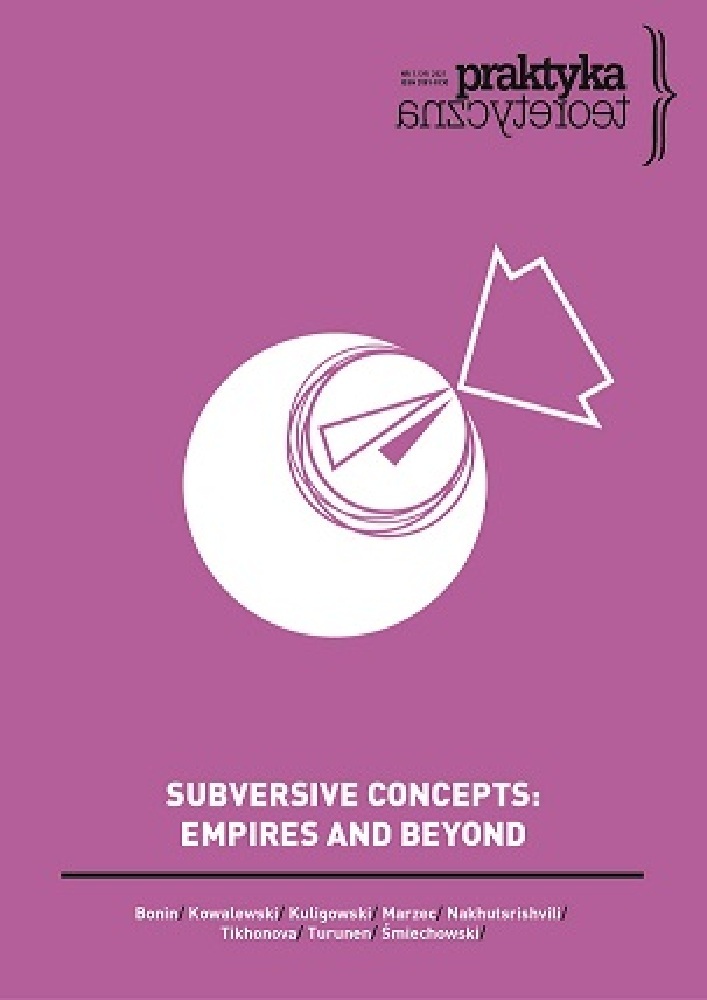Abstract
“The worst thing one can do with words,” George Orwell once wrote, “is to surrender to them.” One must “let the meaning choose the word, and not the other way,” to use language for “expressing and not for
concealing or preventing thought,” he continued (1953, 169). For centuries, social movements “let the meaning to choose the words” and actively sought new categories to grasp the world. They also expressed
the desire for a new world but often surrendered to words when imagining it. Medieval heretics, French revolutionaries, and various socialist movements on the fringes of the Russian Empire one hundred years
later, as well as groups like nationalist urban reformers, Muslim modernizers, and democratic antisuffragists–all had to face fossilized concepts that they attempted to question and modify, actively reappropriating them to forge new configurations. They also inherited the existing language and other sign systems, which cannot be modified at will without the risk of losing the capacity to communicate. To paraphrase Karl Marx’s nutshell definition of historical agency, people make use of their concepts but they do not do so as they please; they do not do so under self-selected circumstances but, rather, under the already-existing circumstances given and transmitted in language and social relations.
References
Arditi, Benjamín, and Jeremy Valentine. 1999. Polemicization: The Contingency of the Commonplace. Edinburgh: Edinburgh University Press.
Bonin, Hugo, and Francis Dupuis-Déri. 2019. “Quelle approche pour quelle histoire des idées politiques?” Revue Française d’Histoire des Idées Politiques 49(1): 273‒303. https://doi.org/10.3917/rfhip1.049.0273.
Carreira da Silva, Filipe and Mónica Brito Vieira. 2019. The Politics of the Book: A Study on the Materiality of Ideas. University Park, Pennsylvania: The Pennsylvania State University Press.
Gerasimov, Ilya, Sergey Glebov, Alexander Kaplunovski, Marina Mogilner, and Alexander Semyonov. 2005. “In Search of a New Imperial History.” Ab Imperio 1: 33–56.
Lovejoy, Arthur O. (1937) 1964. The Great Chain of Being: A Study of the History of an Idea. Cambridge, Massachusetts; London: Harvard University Press. Citations refer to the Harper & Row edition.
Matonti, Frédérique. 2012. “Plaidoyer pour une histoire sociale des idées politiques.” Revue d’Histoire Moderne & Contemporaine 59-4bis (5): 85‒104. https://doi.org/10.3917/rhmc.595.0085.
Mogilner, Marina. 2014. “New Imperial History: Post-Soviet Historiography in Search of a New Paradigm for the History of Empire and Nationalism.” Revue d’Études Comparatives Est-Ouest 45(2): 25–67. https://doi.org/10.4074/S0338059914002022.
Orwell, George. 1953. “Politics and the English Language.” In Orwell, George. A Collection of Essays. New York: Harcourt Brace Jovanovich.
Rioufreyt, Thibaut. 2019. “La mise en politique des idées. Pour une histoire sociale des idées en milieu partisan.” Politix 126(2): 7‒35. https://doi.org/10.3917/pox.126.0007.
Sabine, George H. (1938) 1961. A History of Political Theory. 3rd ed. New York: Holt, Rinehart and Winston.
Scott, James C. 1990. Domination and the Art of Resistance: Hidden Transcripts. New Haven: Yale University Press.
Skornicki, Arnault, and Jérôme Tournadre-Plancq. 2015. La nouvelle histoire des idées politiques. Paris: La Découverte.
Smadja, David. 2016. “L’histoire des idées politiques en débat: Les enjeux épistémologiques de la contextualisation.” Raisons Politiques 64(4): 111‒24. https://doi.org/10.3917/rai.064.0111.
License
“Theoretical Practice” seeks to put into practice the idea of open access to knowledge and broadening the domain of the commons. It serves the development of science, thinking and critical reflection. The journal is published in open-access mode under the CC-BY-NC-SA 4.0 license (detail available here: http://creativecommons.org/licenses/by-nc-sa/4.0/). Articles published in the journal may be freely distributed, stored, printed and utilized for academic and teaching purposes without restrictions.
They should not be, however, used for any commercial purposes or be reconstructed into derivative creations. Access to the journal may not be limited or offered for a fee by any third party.
Prospective authors are obliged to fill in, sign and send back the publishing contract compliant with the CC licencing. [PL.pdf, PL.doc, EN.pdf,EN.doc].
According to this contract, authors grant the journal a non-exclusive right to publish their work under the creative commons license (CC-BY-NC-SA 4.0) without any financial obligation on both sides of the contract.
Before submission authors should make sure that derivative materials they use are not protected by copyright preventing their non-commercial publication. Authors are responsible for any respective copyright violations.

